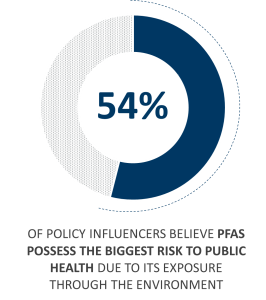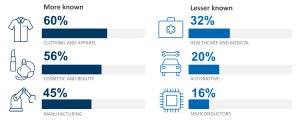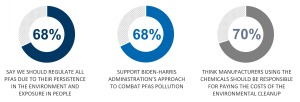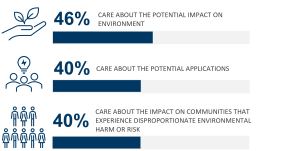PFAS is the Number One Chemicals Issue for Washington, DC Policy Influencers
According to a recent FTI Consulting survey of DC policy influencers,[1] PFAS is the top area of concern in chemicals, ranking second only to greenhouse gases as the top perceived environmental risk to public health. There are over 9,000 chemistries that could be defined as PFAS.[2]
While some parties support regulation of PFAS chemistries under a class approach, others support evaluating these chemistries based on their individual properties and use cases.[3] A class approach could have wide-reaching impacts on many sectors of the U.S. economy given that PFAS chemistries enable numerous essential applications in, for example, semiconductors, renewable energy, and medical equipment. [4]

The findings of our research point to the significant challenges facing those seeking to achieve manageable regulatory outcomes that address potential environmental and health concerns around the chemistries, as well as for the manufacturers of PFAS and the many essential applications that they enable, including in applications necessary to advance the energy transition.[5]
Our research points to three areas of concern:
1. The first finding is around the applications that PFAS enable. Policy influencers are generally significantly more aware of consumer applications for PFAS, such as apparel and cosmetics, than they are about applications in the medical device, automotive, and semiconductor sectors. The gap is anywhere from 24 percentage points to 44 percentage points. This is not necessarily surprising given the focus of both media and environmental groups on consumer applications.

2. The second is around trust in information. Less than one-third of policy influencers see the chemical industry as very trustworthy (29%), but industry does rank better than other groups. Policy influencers also have relatively low levels of significant trust in environmental advocacy groups (28%) and academia (25%). Federal government agencies fare slightly worse (24%), while media (14%) and plaintiff’s attorneys (10%) rank the lowest.
POLICY INFLUENCERS TRUST THE CHEMICALS INDUSTRY THE MOST

3. The third is what policy influencers think needs to be done from a regulatory perspective. A significant majority (76%) believes U.S. laws and regulations either need to be more strongly enforced or modernized and strengthened. A majority (68%) also at least somewhat subscribe to the view that PFAS should be regulated as a class, and there is strong support by over two-thirds of policy influencers for the Biden administration’s current plans to regulate PFAS. Furthermore, policy influencers strongly believe that manufacturers using the chemistries in question above any others should be responsible for remediating any environmental issues (70%).
VIEWS ON PFAS REGULATION AND REMEDIATON OF ENVIRONMENTAL IMPACTS

What does all of this mean?
The facts around PFAS chemistries are not effectively reaching policy influencers, although influencers are looking for more information to better inform their positions. The top three areas of additional information that policy influencers would like on PFAS are its potential impact on the environment, the potential applications of the chemistries, and the impact on communities that experience a disproportionate environmental impact from PFAS. This suggests that there is an opportunity for science, essentiality of high-value applications, and socioeconomic considerations to inform opinions.
TOP 3 AREAS OF INTEREST ABOUT PFAS

Adding to this, policy influencers do not feel that the typical sources of information are doing a particularly good job in reaching them with the right information. Manufacturers and industry organizations will be challenged by this. However, not all is lost, as policy influencers do say that they find information on chemical policy from the chemical industry at least somewhat credible (with more than 4 in 5 saying it is at least somewhat credible, versus 1 in 10 saying it is not credible). Even though the environment is less than ideal, information from the chemical industry overall is viewed as more reliable than information from individual companies, but the trust gap must still be closed with information around the chemistries, their applications, and actions being taken to abate emissions and remediate legacy issues. Despite the challenges facing individual manufacturers, industry as a group and companies individually need to address these three key areas comprehensively.
Taking these together, manufacturers need to rethink how they are engaging with policy influencers and how they are educating them. Traditional third-party conduits, such as media, can no longer be relied upon exclusively. Increasingly, reaching policy influencers will take direct advocacy tailored to identified policy influencers, as well as the use of non-industry third parties. Digital tools are increasingly making this type of advocacy a primary channel for influencers to address the very real knowledge gap challenges that policymakers face as they try to address policy issues related to PFAS.
Finally, without a better understanding of PFAS and the different types of PFAS, broad regulation is seemingly more likely than not. This is a general trend in the U.S. and elsewhere, but one that goes against how classes of chemistries have been traditionally regulated. Additionally, this type of regulation and the heightened attention on environmental justice issues could increase already high levels of litigation being driven by plaintiff’s attorneys. Despite the lack of policy influencer trust in plaintiff’s attorneys, they are experts in seeding the landscape with high volumes of information helpful to their legal positions, which is often done through advertising and environmental third-party advocacy and carried by traditional print media.

|
We hope you found the report useful. Please contact us with any questions. |
[1] FTI Consulting conducted this survey among 100 DC policy influencers between May 20th – 23rd, 2022. FTI defines policy influencers as anyone who currently works in either a government, policy, political, or communications capacity in Washington, DC. Furthermore, respondents must consume at minimum 3 or more policy communications daily and pay attention to debates around PFAS, chemicals, ESG, EPA regulations, and environmental justice issues more broadly.
[2] Hogue, Cheryl. “There’s No Need to Control PFAS as a Class, Industry Scientists Say.” Chemical and Engineering News, May 19, 2021. https://cen.acs.org/environment/persistent-pollutants/no-need-control-PFAS-as-class-industry-scientists-say/99/i19.
[3] Buck, Robert, Stephen Korzeniowski, Evan Laganis, and Frank Adamsky. “Identification and Classification of Commercially Relevant per- and Poly-Fluoroalkyl Substances (PFAS).” Integrated Environmental Assessment and Management (IEAM), May 14, 2021. https://setac.onlinelibrary.wiley.com/doi/10.1002/ieam.4450.
[4] “Policy Principles on PFAS Chemicals.” U.S. Chamber of Commerce, March 11, 2021. https://www.uschamber.com/environment/policy-principles-on-pfas-chemicals.
[5] Ameduri, Bruno. “The Promising Future of Fluoropolymers.” Macromolecular Chemistry and Physics, January 5, 2021. https://hal.archives-ouvertes.fr/hal-02926117.
The views expressed in this article are those of the author(s) and not necessarily the views of FTI Consulting, its management, its subsidiaries, its affiliates, or its other professionals.
©2022 FTI Consulting, Inc. All rights reserved. www.fticonsulting.com



